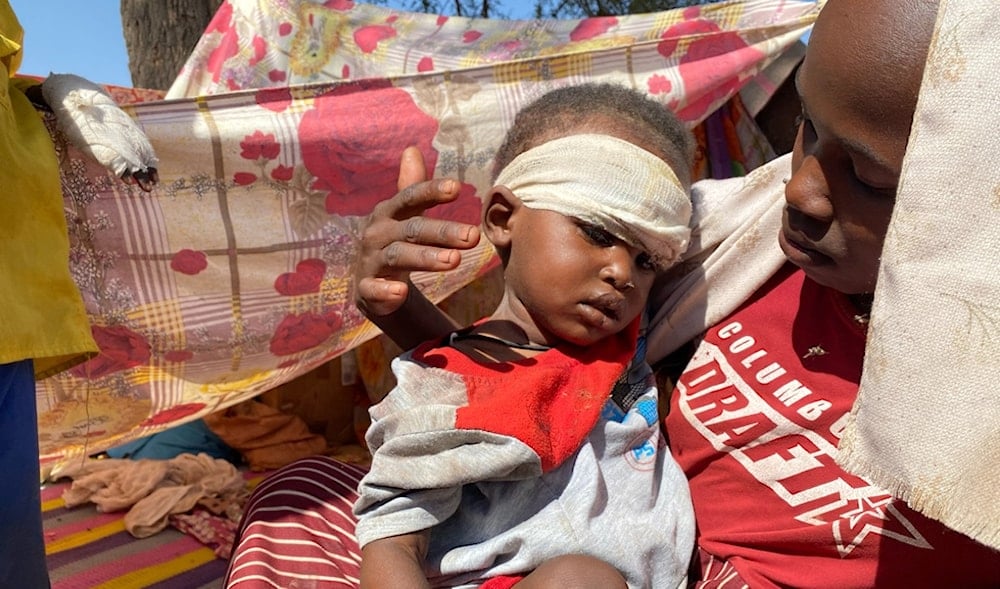RSF used banned nerve gas in attack on El Fasher: Sudanese ambassador
Sudan's ambassador to Cairo revealed that the Rapid Support Forces used banned nerve gas in the El Fasher attack, calling it part of a wider campaign of ethnic violence amid the Sudan war.
-

A Sudanese child who fled El Fasher city with family receives treatment at a camp in Tawila, Sudan, Sunday, Nov. 2, 2025. (AP)
Sudan’s ambassador to Cairo, Imad al-Din Adawi, revealed on Sunday that the Rapid Support Forces (RSF) used internationally banned nerve gas during its large-scale assault on the city of El Fasher. The attack also involved intense shelling, armored incursions into neighborhoods, and a complete cutoff of communications with the city.
Nerve gas is a type of chemical weapon that disrupts the nervous system, leading to paralysis, convulsions, and death if not treated quickly. It is odorless, colorless, and extremely lethal even in small amounts. Its use is banned under international law, including the Chemical Weapons Convention, due to its inhumane and indiscriminate nature.
Army withdrawal to protect civilians
Adawi stated that the Sudanese army command made the decision to withdraw its forces from El Fasher to alternative locations in an effort to protect civilians trapped inside the city, aiming to prevent further harm to the population and preserve both private and public property.
According to Adawi, the RSF’s entrance into the city marked the beginning of a campaign its leadership had long threatened: the systematic targeting and genocide of El Fasher’s residents, particularly those from specific tribes and communities.
“What has taken place and continues to unfold in El Fasher is not an isolated event, as the militia seeks to portray,” Adawi said, noting that the attack reflects a broader strategy that has unfolded in areas such as Omdurman, villages in al-Jazira, and regions in Sennar, An-Nil al-Abyad, and al-Junaynah against the Masalit population.
Bargo Midoum, displaced from El Fasher, recounts horrific crimes: women and children raped and killed, families annihilated, streets turned into mass graves.
— Al Mayadeen English (@MayadeenEnglish) November 2, 2025
Most of these atrocities go unseen, unheard, and unreported. What he shares is only a fraction of the horrors endured by… pic.twitter.com/UMFxqSdSG0
Government rejects peace talks without Jeddah terms
The ambassador emphasized that the Sudanese government would not engage in any peace agreements or ceasefires that fail to meet the terms outlined during the Jeddah talks. He affirmed that the final decision on any political settlement belongs to the Sudanese people, who continue to endure the consequences of the conflict.
Adawi also described the RSF as a militia built on ethnic supremacy and racism, stressing that it views other Sudanese citizens as inferior and treats them with extreme brutality.
Massive displacement and humanitarian crisis
The attack on El Fasher has triggered large waves of displacement toward the nearby town of Tawilah, which Adawi said is a small area struggling to meet the urgent humanitarian needs of incoming families.
At least 970 civilians were displaced from the village of Mizbat in Umm Baru locality, #NorthDarfur, in a single day due to worsening insecurity, Anadolu reported, citing the International Organization for Migration (IOM).
— Al Mayadeen English (@MayadeenEnglish) November 2, 2025
The #UN agency said its field teams reported the mass… pic.twitter.com/Y5oxZK2a2v
He raised critical questions about the situation, “Who is arming the militia and supplying it with money and equipment? What has the Security Council done to stop this genocide? How can those defending civilians be equated with those killing them?”
Adawi rejected the notion that any serious ceasefire proposal had been made and reiterated the Sudanese government’s stance that there would be no negotiations with "a terrorist group."
He conveyed the army’s commitment to its constitutional duty, stating that, in light of international inaction, the Sudanese Armed Forces would continue efforts to protect civilians and restore stability, as seen in Khartoum, al-Jazira, Sennar, and An-Nil al-Abyad.
In late October, the Rapid Support Forces seized control of El Fasher, the capital of North Darfur. The paramilitary has since been accused of widespread atrocities, including the execution of hundreds of civilians, the displacement of thousands, and the ongoing siege of more than 177,000 people trapped inside the city.
Read more: 300 women killed, 25 raped by RSF in Al-Fashir, says Sudanese Minister

 4 Min Read
4 Min Read








